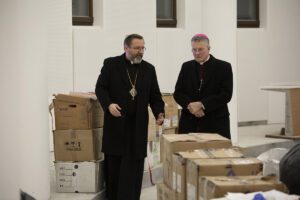ROME (CNS) – With the first anniversary of Russia’s large-scale invasion of Ukraine just days away, the head of the Ukrainian Catholic Church spoke about gratitude and powerlessness in the face of a “blind, absurd, sacrilegious war.”
Archbishop Sviatoslav Shevchuk, major archbishop of Kyiv-Halych, spoke with a small group of reporters in Rome by Zoom Feb. 20 from Kyiv, a city he has left only a couple of times and only for a few days in the past year.
Like many Ukrainians who refuse to leave or have returned even to heavily damaged homes, the archbishop said, “I have a psychological difficulty in abandoning Kyiv. Everyone asks me to come for this conference or that visit, but I can’t leave Kyiv for more than a week. I am afraid something will happen” if he does leave.
Perhaps that is for the best, he said. “A bishop must live in his see.”

As the archbishop was being interviewed, U.S. President Joe Biden was visiting Kyiv.
A year ago, as it appeared Russia was about to invade, all the embassies in Kyiv — except for those of the Vatican and Poland — moved operations to western Ukraine or to Poland, the archbishop said. “A year later, they’ve all returned and now the president of the United States has come.”
Archbishop Shevchuk said he obviously could not comment on the political or military importance of the visit of Biden or other world leaders, but “speaking in the name of common citizens, we feel like we have not been forgotten and abandoned.”
“It’s a great consolation that you have not abandoned us,” he said. “The Russian army condemned us to death. This solidarity, shown in the visits, gives us hope that the sentence will not be carried out and that we are able to survive, defend ourselves and build a free and democratic country.”
A year after Russia started its all-out attack on Ukraine, Archbishop Shevchuk said he felt “joy and gratitude” that Ukraine is still there, that the Ukrainian church has found myriad ways to support the people and that Catholics around the globe have shown their solidarity, including concretely by sending aid.
But, he said, he also has experienced a great sense of impotence.
“For the first time in my life, I’ve seen how modern weapons are able to destroy everything: life, cities, even the environment,” he said. “And in the face of this use of blind violence, the whole world has shown itself to be impotent.”
Yet, the archbishop said, “I am proud of my bishops, priests, monks and nuns who have seen Christ present in those people wounded by the war. We truly have met the living Christ in those who are hungry, without a home, without anything.”
Tens of thousands of people have turned to the church for material and spiritual help, he said. “They trust us completely; they have placed their lives completely in the hands of the church, and when I think about their total trust, it moves me. And I say, ‘Lord, give me the faith to entrust myself to you like these people are entrusting themselves to their pastors.'”
A year of war and death is taking its toll on everyone, including the priests and bishops, he said. “They are becoming demoralized because almost every day they must celebrate the funerals of new victims, military and civilian. A bishop said to be, ‘Your Beatitude, there are funerals without end.'”
Asked about victims of the war among the clergy, Archbishop Shevchuk again demanded the release of two Eastern-rite Redemptorist priests — Father Ivan Levitsky and Father Bohdan Geleta — who were detained by Russian troops in the occupied city of Berdyansk in November.
“For 100 days they have endured daily torture,” he said. “No negotiation, no form of diplomacy or dialogue has been able to end the suffering of these two.”
Father Vitaliy Zubak and St. Joseph Sister Darija Panast were injured by Russian artillery fire while delivering aid in late January, the archbishop said, but they are recovering.
And, he said, a small community of Incarnate Word priests are still in a Russian-occupied town — the archbishop would not say which for their safety — where they live “clandestinely. It’s a miracle that they are still there. They cannot exercise their ministry, but they are there praying.”
The Ukrainian Council of Churches and Religions has identified about 500 churches, synagogues, temples and mosques that have been destroyed or heavily damaged in the fighting. Most of those are in eastern Ukraine where there were not many Catholics, Archbishop Shevchuk said.
The Ukrainian Catholic cathedral in Donetsk “is damaged, but still standing, although there are no priests left,” so no services are held inside, he said. Another 16 churches belonging to Eastern-rite Catholics have been damaged or destroyed.
The entire population has been traumatized by the repeated, piercing sound of air-raid sirens and the daily barrage of missiles exploding, he said. “We are not ashamed of these wounds of Christ that we see each day on the body of our people. And we pray for peace.”
